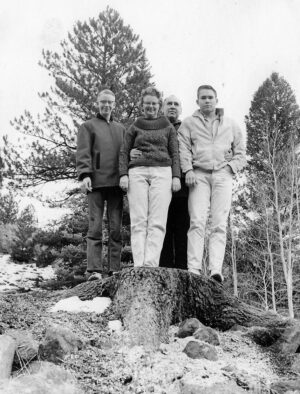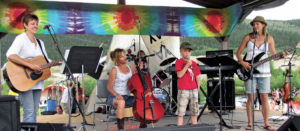Whose History is It? Theirs or Ours?
By Martha Quillen
In the 1990s, an increasing number of New West historians tried to alter common ideas about Old West history. Their attempts to change people’s minds were met with vociferous derision, passionate support and hot debate.
And thus, American history experienced a renaissance, which thereby boosted the fame and fortune of a number of professors who had hitherto taught a subject viewed as fairly stodgy (especially when one considered its financial clout in comparison to medicine and MBAs).
Perhaps more surprisingly, Central Colorado became a beneficiary of that controversy. It was our region that everyone was arguing about — our history, our bailiwick.
Central Colorado sits smack dab in the center of Old West folklore. Bat Masterson operated a saloon in Creede. Wyatt Earp and Doc Holliday spent time in Gunnison. Prostitutes and dance-hall girls kept Salida’s Front Street (now Sackett Avenue) and Leadville’s State Street hopping, while outlaws, rustlers, con-men and claim jumpers kept posses and lawmen busy from Westcliffe to Fairplay.
Once upon a time, our region was a multicultural mecca. As the railroads spread and the mines proliferated, word went out. Union and Confederate veterans came here to start life anew. German settlers farmed our valleys. Lithuanians, Swedes, Irishmen and Italians arrived to work the mines. Chinese immigrants operated opium dens in half a dozen local “Hop Alleys,” and outlaws, prostitutes, clerks, teachers and preachers arrived to serve the growing population.
Therefore it was only fitting that New West debates be staged here — and they were. Patricia Nelson Limerick, a history professor at the University of Colorado, leading revisionist, author of Legacy of Conquest, and co-founder and director of the Center for the American West, was featured at numerous presentations in Central Colorado in the 1990s. Colorado’s Front Range colleges hosted event after event featuring America’s best known revisionists, and Adams State and Western State colleges both provided discussions and conferences about the issues.
Ed and I attended many of them, and they were fascinating. But curiously enough, they were seldom about history. History is the record of what happened, whereas New West seminars tended to be about historiography, which looks at how history is recorded and presented.
As it turns out, revisionist historians think Frederick Jackson Turner, a nineteenth century historian credited with initiating what’s known as the “frontier thesis,” has a lot to do with how we view history. Living out here where it happened, I tend to doubt that. (But I suppose it’s only natural that historians would get to thinking that they actually create history — since they’re so familiar with it.)
Revisionists generally claim that Turner’s thesis is given to triumphalism, hero-worship, nationalistic bombast and racism. I don’t disagree, but a lot of people must have liked Turner’s assumption that Americans are inventive, exuberant and courageous — or his words wouldn’t still be in print today.
And Turner’s thesis definitely impressed historians. But I suspect that all of us influence history — and that historical bias is less a matter of what narrative the historian presents than it is of the attitude of those who live where it’s happening, and thus record the events, keep the accounts, write the letters, make entries in the diaries, save the pictures, report for the newspapers, turn out the tourist brochures, and provide information for the obituaries.
For more than 30 years I’ve fact-checked material for regional publications, and in my experience, inaccuracy (and occasionally purposely falsified information) flourishes in books, newspapers, and census reports, and can be found in government documents, burial records, death certificates, and even on tombstones. Good researchers try to use primary sources and double-check facts, but errors tend to be duplicated in subsequent records.
From what I know of regional history, locals revised it plenty — long before Turner or Limerick could comment on it.
Turner, after all, was born and raised in Wisconsin and taught at Harvard. So where did he get his exalted ideas about settlers on the frontier? I’d bet he got them from people who live in places like ours, who had straightforward motives for portraying their ambitions as noble and heroic.
Historians, however, tend to think that their guy was the one who skewed the record.
After the 1890 census, the U.S. Census Bureau announced that there was no longer a contiguous frontier line demarcating vast areas of empty land beyond. The American frontier had been settled into extinction.
A few years later, Turner gave a speech at the Chicago World’s Fair declaring that the frontier had been a definitive element in shaping America’s character: “That coarseness and strength combined with acuteness and acquisitiveness; that practical, inventive turn of mind, quick to find expedients; that masterful grasp of material things, lacking in the artistic but powerful to effect great ends, that restless, nervous energy, that dominant individualism, working for good and for evil, and withal that buoyancy and exuberance which comes with freedom — these are traits of the frontier, or traits called out elsewhere because of the existence of the frontier. Since the days when the fleet of Columbus sailed into the waters of the New World, America has been another name for opportunity, and the people of the United States have taken their tone from the incessant expansion which has not only been open but has even been forced upon them … But never again will such gifts of free land offer themselves.”
Revisionists, however, question the very concept of an American frontier, since the “free land” Turner refers to was carved from designated Indian lands which were already populated.
Despite all of the arguments about new vs. old history, the facts were never in dispute. Both sides agree that Sand Creek was a travesty censured by the U.S. Congress, Indian treaties were broken, and Jefferson and Washington were slave owners. The only thing in contention is what sort of “narrative” the historian should present, or to put it less academically: How much ink should Americans give their less inspiring actions?
Although Turner’s frontier thesis is often presented as a dominant American concept, it was controversial from the beginning. Turner’s contemporaries thought his ideas sounded too Darwinian — as if America had merely evolved, rather than been shaped by its founders and forged by its principles.
And revisionist historians were certainly not the first to question whether Americans were truly strong, courageous and bold. On the contrary, Americans were often characterized as vainglorious bumpkins.
George Clemenceau, Oscar Wilde and George Bernard Shaw have all been credited with contending that America is the only nation to have passed from barbarism to decadence without passing through Civilization. Only one of them (most likely Clemenceau) could have said it first, but the other two zealously supported such notions.
Likewise Edith Wharton, an American novelist, wrote, “How much longer are we going to think it necessary to be ‘American’ before (or in contradistinction to) being cultivated, being enlightened, being humane, and having the same intellectual discipline as other civilized countries?”
So what was really new about New West thinking? What made it so attention-grabbing? So vibrant? And so infuriating to so many?
For me, its appeal was the idea that what we believe about ourselves really matters. Because Turner was wrong: it’s not the frontier that gives Americans their determination and gall. Nor is it our innate superiority. It is our conviction that what we think is important, whether we be young or old, rich or poor, urban or rural — or right or wrong.
After decades of copy editing, Martha Quillen has not yet found a way to banish errors; so she’s currently trying to learn how to ignore them.



